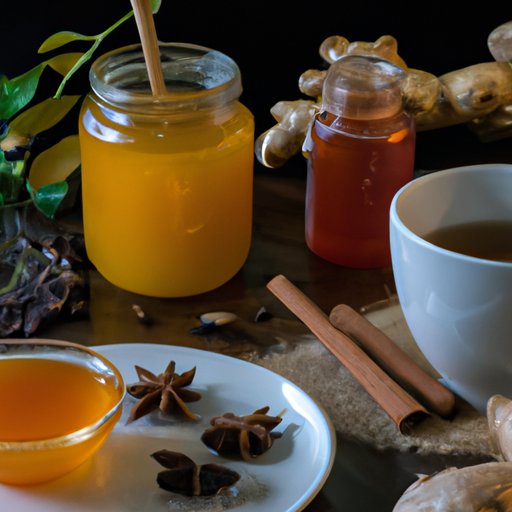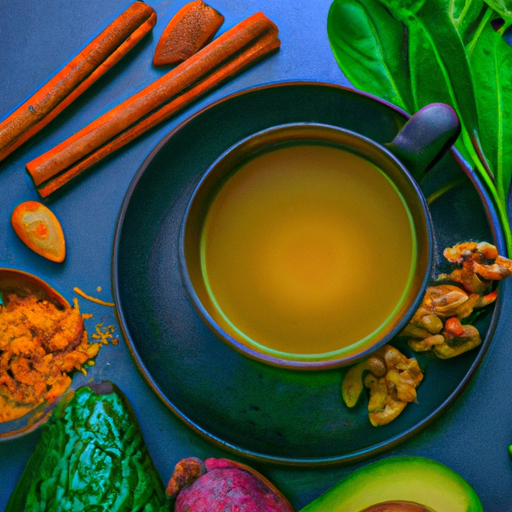Are you ready for a change from your usual cup of tea? Do you desire to elevate your tea experience and incorporate some healthy perks into your daily regimen? Then turmeric tea is the answer for you. This age-old root has been utilized for generations in traditional medicine due to its anti-inflammatory and antioxidant qualities.
But why stop at just turmeric? There are plenty of natural remedies and herbs that can be added to your tea to enhance its flavor and health benefits. From ginger to cinnamon to cardamom, the possibilities are endless.
So, grab your favorite mug and get ready to learn about what to add to your turmeric tea to make it even more beneficial for your body and taste buds.
Key Takeaways
- Adding black pepper or a healthy fat can increase the absorption of curcumin in turmeric tea.
- Ginger, honey, lemon juice, and cinnamon are all great additions to turmeric tea for their anti-inflammatory and immune-boosting properties.
- Milk or non-dairy alternatives can be added to turmeric tea for a creamy texture and added benefits.
- Experiment with different spice and herb combinations, and consider pairing turmeric tea with chai tea, smoothies, yogurt, or using it in baking recipes.
Benefits of Turmeric Tea
You’re gonna love the benefits of adding turmeric to your tea! Not only does turmeric add a delicious and unique flavor to your tea, but it also provides numerous health benefits.
Turmeric is known for its anti-inflammatory properties and has been used in traditional healing practices for centuries. It can help reduce inflammation in the body and has even been shown to potentially improve brain function and lower the risk of heart disease.
When brewing turmeric tea, it’s important to note that the active compound in turmeric, called curcumin, is not easily absorbed by the body. To increase the absorption of curcumin, it’s recommended to add black pepper or a healthy fat, such as coconut oil, to your tea.
Additionally, brewing turmeric tea with ginger can add even more health benefits as ginger is also known for its anti-inflammatory and immune-boosting properties. So why not give it a try and see how adding turmeric and ginger to your tea can benefit your health?
Ginger
Mixing ginger into this warm and invigorating brew not only adds a spicy kick but also complements the earthy undertones of the herb. Ginger is a popular herb known for its unique flavor and various medicinal properties. Adding ginger to your turmeric tea not only enhances its flavor but also provides numerous health benefits.
In terms of health benefits, ginger is known to alleviate nausea, reduce inflammation, and boost immune function. It also contains antioxidants that help protect the body against oxidative stress and chronic diseases. In addition to its medicinal properties, ginger is also widely used in cuisine. It adds a spicy kick to dishes and is a common ingredient in many Asian recipes. Incorporating ginger into your turmeric tea not only provides health benefits but also adds a delicious flavor to your daily routine.
Transitioning into the subsequent section, adding honey to your turmeric tea can provide additional health benefits.
Honey
Honey is a sweet and flavorful addition to this warm beverage that not only enhances its taste but also provides additional health benefits. Here are 4 ways you can incorporate honey into your turmeric tea:
- Using flavored honey in turmeric tea, such as lavender or cinnamon, can add a unique twist to your drink.
- Honey has anti-inflammatory properties that can complement the effects of turmeric. It can also soothe a sore throat and alleviate coughs.
- Honey is a natural sweetener that can replace processed sugar, which can have negative effects on health.
- Honey contains antioxidants that can boost the immune system and improve overall health.
By adding honey to your turmeric tea, you can enjoy a flavorful and healthy beverage that is tailored to your individual needs.
In the next section, we’ll discuss the benefits of adding lemon juice to your drink.
Lemon Juice
Ah, the tangy addition of lemon juice to your golden drink truly elevates your turmeric tea game. Not only does it add a refreshing twist to the earthy taste of turmeric, but it also provides numerous health benefits. Lemon juice is rich in vitamin C, which is known for its immune-boosting properties. It also contains antioxidants that help fight off free radicals in the body, reducing the risk of chronic diseases such as cancer and heart disease.
You may be wondering what other alternative options there are to add to your turmeric tea. Fear not, for there are plenty of options to choose from. Check out the table below for some inspiration on what to add next to your cup of golden goodness. But for now, let’s move on to the next addition to your turmeric tea – cinnamon.
Cinnamon
If you’re looking to add a warm and spicy flavor to your turmeric tea, cinnamon is the perfect addition. Not only does it taste great, but it also has anti-inflammatory properties that can help ease inflammation and pain in the body.
Incorporating cinnamon into your daily routine is a natural and holistic way to support your health and well-being.
Warm and spicy flavor
Adding a pinch of black pepper to your turmeric tea will give it a warm and spicy flavor that’ll awaken your taste buds. Black pepper has been used for centuries in spice blends and culinary dishes, and it’s also known for its health benefits. When combined with turmeric, it can increase the bioavailability of curcumin, the active ingredient in turmeric. This enhances its antioxidant and anti-inflammatory properties.
Incorporating natural remedies and traditional healing practices can help improve overall health and well-being. By personalizing treatment plans, individuals can focus on their specific needs and goals.
In the next section, we’ll explore the anti-inflammatory properties of turmeric and how it can benefit the body.
Anti-inflammatory properties
If you’re looking to add more warmth and spice to your turmeric tea, you’ve got plenty of options. Ginger, cinnamon, and cardamom are all great choices that not only add flavor but also offer their own health benefits.
But did you know that you can also add other ingredients to your turmeric tea to enhance its anti-inflammatory properties? Herbal alternatives and dietary supplements are great ways to boost the anti-inflammatory effects of turmeric tea.
For example, adding a few drops of peppermint oil can help soothe digestive issues and reduce inflammation in the gut. You can also try adding a teaspoon of honey for its antibacterial properties and to help soothe a sore throat. Another option is to add a pinch of cayenne pepper, which can help improve blood circulation and reduce inflammation throughout the body.
By experimenting with different ingredients, you can create a personalized turmeric tea that meets your unique health needs and tastes great.
Speaking of enhancing the benefits of turmeric, did you know that adding black pepper can increase the bioavailability of curcumin, the active ingredient in turmeric? This means that your body can absorb more of the beneficial compounds in turmeric when it’s consumed with black pepper.
So, the next step in creating the perfect cup of turmeric tea is to add a pinch of black pepper to your tea.
Black Pepper
To enhance the absorption of curcumin in turmeric tea, you’ll want to sprinkle in a bit of black pepper. This may seem like an odd addition to tea, but adding black pepper can actually increase the bioavailability of curcumin by up to 2000%.
Here are a few other reasons you may want to add black pepper to your turmeric tea:
- Black pepper has its own health benefits, including antioxidant and anti-inflammatory properties.
- The combination of turmeric and black pepper is commonly used in Ayurvedic medicine to treat a variety of ailments.
- Black pepper can add a spicy kick to your turmeric tea, making it a flavorful and satisfying beverage.
- The piperine in black pepper may also help improve digestion and relieve gas and bloating.
- Adding black pepper to your turmeric tea is an easy and natural way to enhance the health benefits of this traditional beverage.
Now that you know how to boost the benefits of your turmeric tea with black pepper, let’s move on to the next step: adding milk.
Milk
If you’re looking to add a creamy texture to your turmeric tea, milk is a great option for you. It not only adds a smooth consistency to your drink, but also a mellow flavor that complements the earthy taste of turmeric.
Incorporating milk into your tea is a natural and holistic way to enhance the taste and benefits of your beverage, while also catering to your individual preferences.
Creamy texture
Achieving a creamy texture in your turmeric tea can be easily done by adding a splash of coconut milk or almond milk. Whipped cream is also a great option, but for those looking for a dairy-free alternative, coconut milk will do the trick.
Here are some ideas for achieving a creamy texture:
- Add a spoonful of coconut cream for a richer consistency
- Mix in some avocado for a healthy fat boost
- Blend in a banana for a sweet and creamy taste
- Use cashew milk for a nutty and creamy texture
Incorporating these creamy additions not only enhances the flavor of your turmeric tea, but also provides added health benefits. Coconut milk, for example, is a great source of healthy fats and can help improve digestion. Adding a banana not only provides a creamy texture, but also adds potassium and fiber to your drink.
Adding a mellow flavor to your turmeric tea can be done by incorporating a variety of ingredients. By adding some lemon juice or honey, you can give your tea a sweeter taste.
In the next section, we’ll discuss how to add a touch of sweetness to your turmeric tea.
Adds a mellow flavor
Mellowing out the taste of your golden brew can be accomplished by mixing in some honey or a hint of lemon to lend a luscious and lovely flavor. If you’re feeling adventurous, try experimenting with tea pairings or alternative flavors like ginger, cinnamon, or even vanilla extract. Not only do these additions enhance the taste, but they also provide additional health benefits due to their medicinal properties.
Cardamom is another great spice to add to your turmeric tea. Not only does it offer a unique and delicious flavor, but it also has various health benefits such as improving digestion and reducing inflammation.
So, go ahead and try adding a pinch of cardamom to your next cup of turmeric tea and experience the wonderful taste and benefits it has to offer.
Cardamom
Adding cardamom to turmeric tea enhances its flavor with a warm and slightly sweet aroma. Cardamom is a popular spice in traditional Indian cuisine and is often paired with turmeric for its complementary flavors. It also has medicinal properties that add to the benefits of turmeric tea.
If you don’t have cardamom on hand, you can try substituting with cinnamon or nutmeg, but they won’t provide the same depth of flavor. Cardamom pairing ideas include adding it to chai tea, smoothies or yogurt, or using it in baking recipes. It’s also a great addition to savory dishes like curries or rice pilafs.
When using cardamom in recipes, be sure to crush the pods to release the seeds and discard the outer shell.
Next, we’ll explore the benefits of adding cloves to your turmeric tea.
Cloves
Cloves, commonly used in Indian cuisine, are a perfect pairing with the warm and slightly sweet aroma of cardamom in turmeric-infused beverages. They not only add a rich and spicy flavor but also bring a host of health benefits to your drink.
Cloves are known to have anti-inflammatory properties, which can help alleviate pain and reduce swelling. They also contain eugenol, a natural compound that has been shown to have antibacterial and antiviral effects, making it helpful in fighting off infections.
Aside from their health benefits, cloves have a variety of culinary uses. They can be used whole or ground and are often used in spice blends for stews, curries, and marinades. In turmeric tea, a few whole cloves or a pinch of ground cloves can be added to the mixture to give it a warm and spicy kick.
Experimenting with different combinations of spices and herbs can lead to a personalized and delicious way to support your health and well-being.
Experimenting with Different Combinations
If you want to take your turmeric-infused beverage to the next level, have you considered experimenting with different combinations of spices and herbs? Adding flavor enhancements can not only improve the taste of the tea, but also provide additional health benefits.
One pairing suggestion is ginger, which has anti-inflammatory properties and complements the earthy flavor of turmeric. Simply grate fresh ginger into the tea or add a dash of ground ginger powder.
Another herb that pairs well with turmeric is cinnamon. Cinnamon is known for its ability to regulate blood sugar levels and has a slightly sweet taste that complements the bitterness of turmeric. You can add a cinnamon stick to the tea while it’s steeping or sprinkle cinnamon powder on top of the finished drink.
Don’t be afraid to play around with different combinations and find what works best for you and your individualized and personalized treatment plan.
Frequently Asked Questions
Can turmeric tea help with weight loss?
Looking to shed some pounds? Turmeric tea can aid in weight loss by boosting metabolism and reducing inflammation. Additionally, drinking turmeric tea can benefit digestion, among other health benefits. Incorporating natural remedies like turmeric into your personalized treatment plan is a great way to support overall wellness.
Is it safe to consume turmeric tea while pregnant or breastfeeding?
If you’re pregnant or breastfeeding, it’s important to know if turmeric tea is safe. While some research suggests it may benefit lactation, it’s best to consult with your healthcare provider before consuming. Emphasize natural remedies and personalized treatment plans.
Can turmeric tea help with arthritis pain?
"Natural remedies and alternative therapies like turmeric tea have been known to relieve arthritis pain. With a focus on individualized treatment plans and knowledge of traditional healing practices, holistic health can be achieved." ‘By incorporating these practices into a comprehensive approach to wellness, individuals with arthritis can experience improved mobility, decreased inflammation, and an overall improved quality of life.’
How much turmeric should be added to a cup of tea for maximum health benefits?
Did you know that turmeric has been used for centuries in Ayurvedic medicine? When it comes to turmeric tea, finding the perfect dosage is key for maximum health benefits. Learn more about the benefits and risks of turmeric dosage, as well as tips for enhancing the flavor of your tea.
Are there any side effects of consuming turmeric tea on a regular basis?
Regular consumption of turmeric tea may lead to long term health benefits, but excessive intake may cause gastrointestinal issues. It’s recommended to start with small doses and gradually increase, based on individual needs and tolerance. Consult with a holistic health practitioner for personalized dosage recommendations.
Conclusion
Congratulations! You now know the many benefits of turmeric tea and how to make it even more delicious and nutritious by adding other natural ingredients.
By incorporating ginger, honey, lemon juice, cinnamon, milk, cardamom, and cloves, you can further enhance the healing properties of this powerful beverage.
But remember, it’s not just about the ingredients you add; it’s also about experimenting with different combinations to find what works best for your body.
With your newfound knowledge of traditional healing practices and herbs, you can create personalized treatment plans that promote holistic health and natural remedies.
So go ahead, explore the world of turmeric tea, and discover the healing power of nature.










